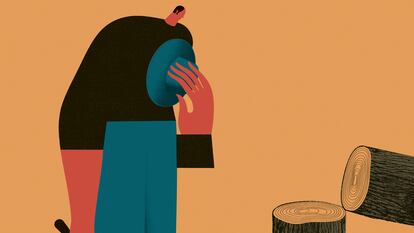What an old friendship that has ended says about us
Friends are our mirrors and losing them or becoming disconnected from them can unleash an emotional storm. But sometimes it also means a transition to another version of ourselves

While it is unavoidable, losing friends late in life is difficult and heartbreaking. A friend’s death can unleash a storm of emotions. It leaves us with the feeling of having lost a part of ourselves, especially if that person belonged to our closest circle and had been with us through thick and thin, as a source of strength, an accomplice and a sounding board. The intimacy of friendship, writes philosopher Jacques Derrida, “lies in the sensation of recognizing oneself in the eyes of the other.” But, curiously, there is another loss of friendship that can be even more difficult to face, which we want to analyze here: disconnection in life. In this case, it is an ambiguous loss, which leads to mourning a person who is alive, something that can be even more emotionally complex. The role of friends tends to become more important as we get older, but it also becomes more difficult to keep them. How can we understand this?
Philosopher Friedrich Nietzsche captures the nature of the unsettling alienation in his Friends as Ghosts (Die Freunde als Gespenster): “If we change significantly, those friends who have not changed become ghosts of our own past: their voice comes to us with a terrifying, spectral sound; as if we were hearing ourselves, but younger, sterner, immature.” For Nietzsche, the specter of the friend includes metaphorical connotations that have to do with fading, the ambiguous, the intangible, that which cannot be experienced immediately. It designates something ambivalent, perhaps indeterminate; it can be someone familiar and strange at the same time — it is a presence that, paradoxically, reveals itself through its absence.
It is natural for friendships to transform as we navigate through life. Quitting or changing jobs and moving can take us away from friends. And it’s common to hear people say that they don’t have enough hours in the day to tackle the tasks on their to-do lists, much less keep up with old friends. These transitions can be conducive to a breakup. As we age, our priorities change and make it difficult to reconcile them with those of old friends. On this journey, it is understandable that some friendships fall by the wayside. And when we are the one left behind, it can be devastating to face the fact that someone who had been so close to us is no longer with us, by dint of a unilateral decision.
Increased differences, misunderstandings or unresolved conflicts are often the cause. One of the main triggers is a loss of trust. Fear plays an important role — fear of rejection, of being exploited or of compromising one’s identity. At the same time, the mechanism that disarticulates the relationship with a friend may respond to unconscious forces, of which the person is unaware. Psychoanalyst Donald Winnicott calls them “primitive agonies.” What happens in the present is something that has already occurred in the psyche and is projected into the future; that which cannot be consciously identified imposes itself on our reality and repeats itself. Time and again, in an attempt to free ourselves from ties to a painful past, the human unconscious takes us back to the original place where things went wrong, with the desire to do it all over again and repair the damage. The friendship at stake becomes the theater in which the disruption unfolds, and the rupture embodies the repetition of an ancestral loss, abandonment or traumatic separation — hence the disproportion between the size of the grievance and the magnitude of its consequences.
I observe it in some patients, who unconsciously intercept my ability to work as their psychoanalyst: instead of looking for connections and meaning, they make sure that no relationships can take hold between past and present, between ideas and feelings, or between them and me. In his article “Attacks on Linking,” psychoanalyst Wilfred Bion describes this as the way people try to circumvent the painful truths of their lives: connections are replaced by disconnections in order to escape the pain of discovering oneself.
In short, losing a friend when we are well into our senior years can be discouraging. On the other hand, it is also the beginning of a transition to another version of oneself. Research has shown that even though distance is associated with profound feelings of loneliness, it can also promote the possibility of improved quality of life. It is not only loss; it is also an opportunity to embark on renewing experiences. That may seem contradictory, but it simply means that by letting go of the familiar, we open ourselves to a world of possibilities.
Sign up for our weekly newsletter to get more English-language news coverage from EL PAÍS USA Edition
Tu suscripción se está usando en otro dispositivo
¿Quieres añadir otro usuario a tu suscripción?
Si continúas leyendo en este dispositivo, no se podrá leer en el otro.
FlechaTu suscripción se está usando en otro dispositivo y solo puedes acceder a EL PAÍS desde un dispositivo a la vez.
Si quieres compartir tu cuenta, cambia tu suscripción a la modalidad Premium, así podrás añadir otro usuario. Cada uno accederá con su propia cuenta de email, lo que os permitirá personalizar vuestra experiencia en EL PAÍS.
¿Tienes una suscripción de empresa? Accede aquí para contratar más cuentas.
En el caso de no saber quién está usando tu cuenta, te recomendamos cambiar tu contraseña aquí.
Si decides continuar compartiendo tu cuenta, este mensaje se mostrará en tu dispositivo y en el de la otra persona que está usando tu cuenta de forma indefinida, afectando a tu experiencia de lectura. Puedes consultar aquí los términos y condiciones de la suscripción digital.








































